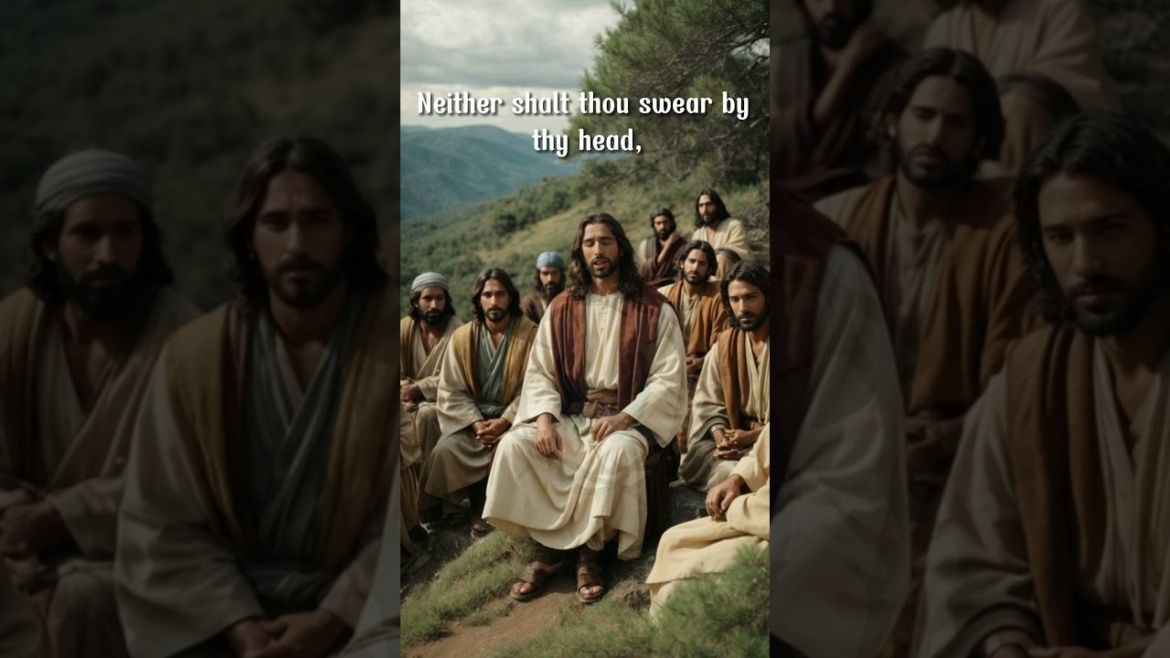The Significance of “Again, ye have heard that it hath been said by them of old time, Thou shalt not forswear thyself, but shalt perform unto the Lord thine oaths: But I say unto you, Swear not at all; neither by heaven; for it is God’s throne: Nor by the earth; for it is his footstool: neither by Jerusalem; for it is the city of the great King. Neither shalt thou swear by thy head, because thou canst not make one hair white or black. But let your communication be, Yea, yea; Nay, nay: for whatsoever is more than these cometh of evil.”
The phrase “Again, ye have heard that it hath been said by them of old time, Thou shalt not forswear thyself, but shalt perform unto the Lord thine oaths: But I say unto you, Swear not at all; neither by heaven; for it is God’s throne: Nor by the earth; for it is his footstool: neither by Jerusalem; for it is the city of the great King. Neither shalt thou swear by thy head, because thou canst not make one hair white or black. But let your communication be, Yea, yea; Nay, nay: for whatsoever is more than these cometh of evil.” is a powerful christian law used by Jesus in Matthew 5:33-37 from the Sermon on the Mount, where he challenges and reinterprets certain Jewish laws and traditions, is a powerful christian law used by Jesus to delve into the complex issue of oaths and truthfulness.
Context of the Phrase
The law appears within Jesus’ Sermon on the Mount, a collection of teachings focusing on right living and morality for spreading God’s message. The law “Again, ye have heard that it hath been said by them of old time, Thou shalt not forswear thyself, but shalt perform unto the Lord thine oaths: But I say unto you, Swear not at all; neither by heaven; for it is God’s throne: Nor by the earth; for it is his footstool: neither by Jerusalem; for it is the city of the great King. Neither shalt thou swear by thy head, because thou canst not make one hair white or black. But let your communication be, Yea, yea; Nay, nay: for whatsoever is more than these cometh of evil.” establishes context and shows respect for tradition, aims to prevent perjury and uphold the sanctity of oaths. So Jesus begins by acknowledging a familiar commandment from the Old Testament: “Thou shalt not forswear thyself”. Jesus then offers his own teaching, stating “Swear not at all”. This may seem like a radical departure, but it’s important to understand the context of oaths in the ancient world that swearing by various entities, such as heaven, earth, Jerusalem, or head, was a common way to add weight to one’s words and invoke divine judgment for falsehood.
Significance of the Phrase
The law “Again, ye have heard that it hath been said by them of old time, Thou shalt not forswear thyself, but shalt perform unto the Lord thine oaths: But I say unto you, Swear not at all; neither by heaven; for it is God’s throne: Nor by the earth; for it is his footstool: neither by Jerusalem; for it is the city of the great King. Neither shalt thou swear by thy head, because thou canst not make one hair white or black. But let your communication be, Yea, yea; Nay, nay: for whatsoever is more than these cometh of evil.” challenges the reliance on external authorities and oaths to guarantee truthfulness. It emphasizes that inner integrity and authenticity are paramount. Swearing by external things, even seemingly sacred ones, is ultimately meaningless if it doesn’t reflect a genuine commitment to truth.
Here are some key points:
Jesus’ teaching here challenges traditional religious practices and emphasizes inward transformation. He critiques outward displays of piety, like oaths, and advocates for a deeper commitment to truthfulness.
Jesus’ teaching here goes beyond simply forbidding oaths. It challenges the very notion of using external mechanisms to guarantee truthfulness. He argues that true integrity comes from a commitment to honesty in every word and action, without needing external validation.
Jesus’ teaching here concludes by suggesting that anything beyond a simple “yes” or “no” likely stems from “evil” intentions. This could refer to attempts to deceive, manipulate, or avoid responsibility through clever wording or elaborate oaths.
Application of the Phrase
The law “Again, ye have heard that it hath been said by them of old time, Thou shalt not forswear thyself, but shalt perform unto the Lord thine oaths: But I say unto you, Swear not at all; neither by heaven; for it is God’s throne: Nor by the earth; for it is his footstool: neither by Jerusalem; for it is the city of the great King. Neither shalt thou swear by thy head, because thou canst not make one hair white or black. But let your communication be, Yea, yea; Nay, nay: for whatsoever is more than these cometh of evil.” emphasizes clarity and simplicity in communication with the “Yea, yea; Nay, nay” instruction. It encourages directness and honesty, avoiding the need for elaborate oaths or justifications. This principle applies not only to religious matters but also to everyday interactions.
Here are some key points:
Cultural and Historical: While the literal prohibition of all oaths might not be universally applicable in today’s world, the core message of Jesus’ teaching remains relevant: true commitment to truthfulness stems from inner integrity and authenticity, not external oaths or invocations.
Debate and Interpretation: Some see it as a literal call to avoid swearing altogether, while others view it as a call for deeper authenticity and sincerity in our communication. Ultimately, it encourages us to reflect on our own relationship with truth and how we embody it in our daily lives.
In summary, the law “Again, ye have heard that it hath been said by them of old time, Thou shalt not forswear thyself, but shalt perform unto the Lord thine oaths: But I say unto you, Swear not at all; neither by heaven; for it is God’s throne: Nor by the earth; for it is his footstool: neither by Jerusalem; for it is the city of the great King. Neither shalt thou swear by thy head, because thou canst not make one hair white or black. But let your communication be, Yea, yea; Nay, nay: for whatsoever is more than these cometh of evil.” are a powerful reminder that true integrity lies not in external oaths or rituals, but in the consistent choice to live truthfully and authentically. It is a call to cultivate inner integrity that shines through in every interaction, regardless of circumstance.
THE CHILD IS INTENDED INTO ONE SUB & NINE EXTREMES
« Samsara Extreme Of Heaven In Child Intended To Exist »
WHAT IS ✨ COLD CHILD SPACE? IT IS JUST CHILD EXTREME!
« Child Extreme’s Code & subExtreme’s Law »













